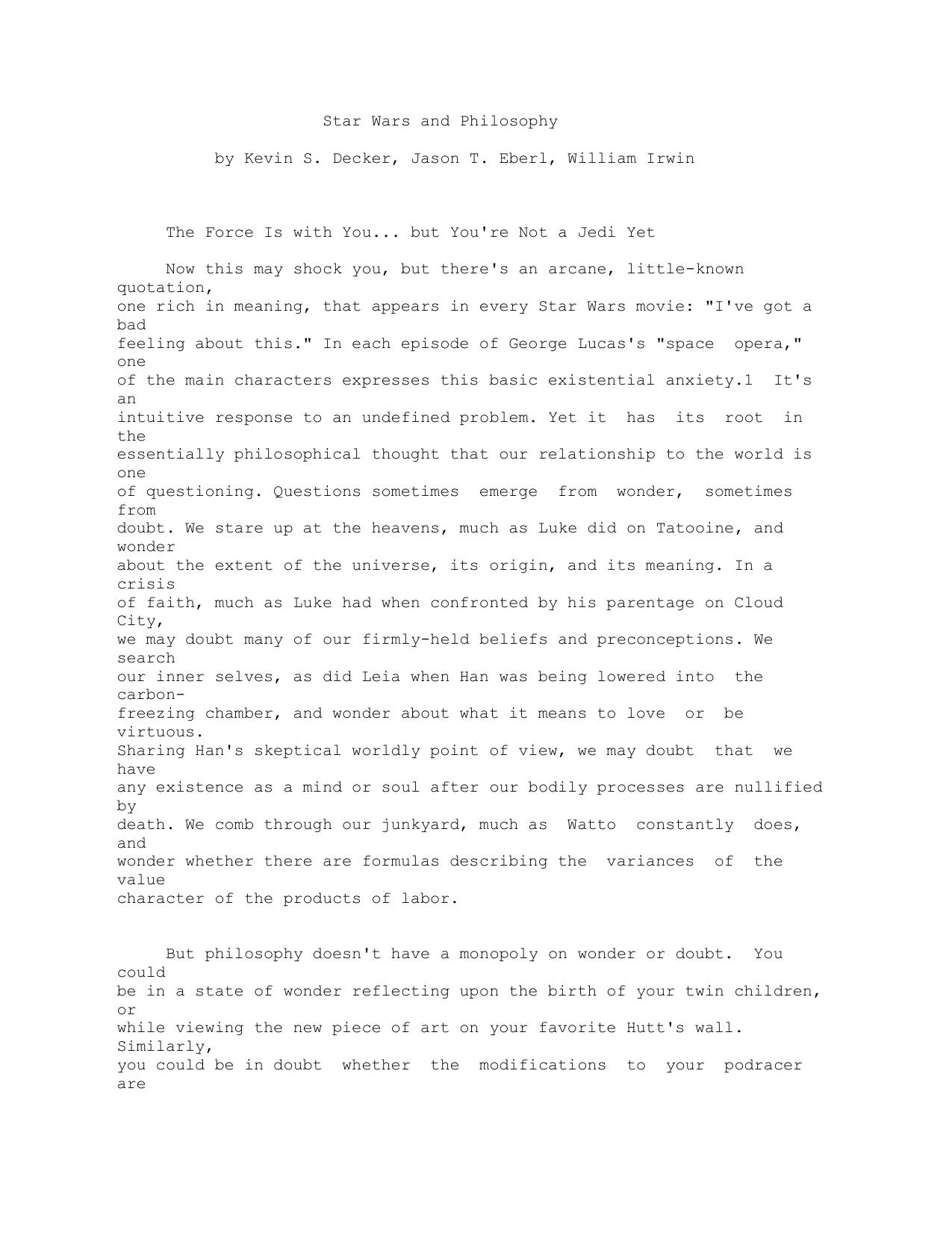Star Wars and Philosophy by Unknown

Author:Unknown
Language: eng
Format: epub, pdf
Published: 2012-03-10T13:35:54+00:00
Part IV
“There’s Always a Bigger Fish” Truth, Faith, and a Galactic Society
“What Is Thy Bidding, My Master?”: Star Wars and the Hegelian Struggle for Recognition
BRIAN K. CAMERON
Star Wars, as the name suggests, is about struggle and conflict, hope and renewal, war and death. On the one side, there are the Rebels, whose struggle for freedom from Imperial domination and fear motivate their supporters and give life to the movement. On the other side, there is the Emperor and his minions who, driven by what philosopher Friedrich Nietzsche (1844-1900) refers to as the “will to power,” willingly sacrifice entire planets and their populations in a ruthless attempt to achieve their goals. Art really does imitate life or, at the very least, it illuminates an important feature of it-namely, the exercise of a certain kind of power.
It isn’t difficult to explain how this kind of power arises; fear is the mechanism that accounts for its existence and strength. It is fear of losing his sister that moves Luke to do the Emperor’s bidding and strike down his father. It is fear that motivates the Senate to form the clone army that ultimately brings about its own demise. And, it’s the fear of losing his mother that sends the young Anakin Skywalker down the path to the Dark Side and prompts the ancient Jedi Master, Yoda, to voice the mantra of his religion: “Fear leads to anger… anger leads to hate… hate leads to suffering.”
Fear illuminates the path to slavery and suffering, the path that leads to the Dark Side. At the same time, though, it reveals a certain mode of exercising power-the way of the Sith Master. The Master rises to his station and maintains his dominance over his apprentices or slaves by evoking and playing upon their fears. And the apprentice or slave maintains himself as a slave by allowing those fears to determine his being. This interplay between power and fear is what the nineteenth-century German philosopher Georg Hegel (1770-1831) called the “master-slave dialectic.” By looking at the Star Wars saga through the lens of Hegel’s master-slave dialectic we will not only better understand the nature and limits of the Emperor’s power, but also why - apart from the Hollywood impulse to give audiences a happy ending-that power failed. And, as an added bonus, Hegel’s analysis forces us to look most carefully at the personal exercise of power, bringing into sharper relief the various characters within the Star Wars galaxy and their motivations.
Masters and Slaves: Who Rules Whom?
Thales, the very first philosopher in the Western tradition, was once asked, “What is most difficult?” He replied, “To know thyself.” Indeed, Thales was not far off the mark: coming to understand ourselves and the value and meaning of our experiences really is one of the most difficult things any of us can do. Similarly, coming to understand how self-knowledge is itself possible, how it arises, and in what it consists is one of the more challenging problems philosophers grapple with. In Star
Download
This site does not store any files on its server. We only index and link to content provided by other sites. Please contact the content providers to delete copyright contents if any and email us, we'll remove relevant links or contents immediately.
Spell It Out by David Crystal(36102)
Life for Me Ain't Been No Crystal Stair by Susan Sheehan(35791)
Cecilia; Or, Memoirs of an Heiress — Volume 1 by Fanny Burney(32531)
Cecilia; Or, Memoirs of an Heiress — Volume 2 by Fanny Burney(31929)
Cecilia; Or, Memoirs of an Heiress — Volume 3 by Fanny Burney(31919)
The Great Music City by Andrea Baker(31905)
Professional Troublemaker by Luvvie Ajayi Jones(29643)
We're Going to Need More Wine by Gabrielle Union(19022)
The Secret History by Donna Tartt(19006)
Twilight of the Idols With the Antichrist and Ecce Homo by Friedrich Nietzsche(18608)
All the Missing Girls by Megan Miranda(15898)
Cat's cradle by Kurt Vonnegut(15309)
Pimp by Iceberg Slim(14468)
Bombshells: Glamour Girls of a Lifetime by Sullivan Steve(14041)
For the Love of Europe by Rick Steves(13831)
Talking to Strangers by Malcolm Gladwell(13334)
Norse Mythology by Gaiman Neil(13320)
Fifty Shades Freed by E L James(13218)
The Social Justice Warrior Handbook by Lisa De Pasquale(12178)
